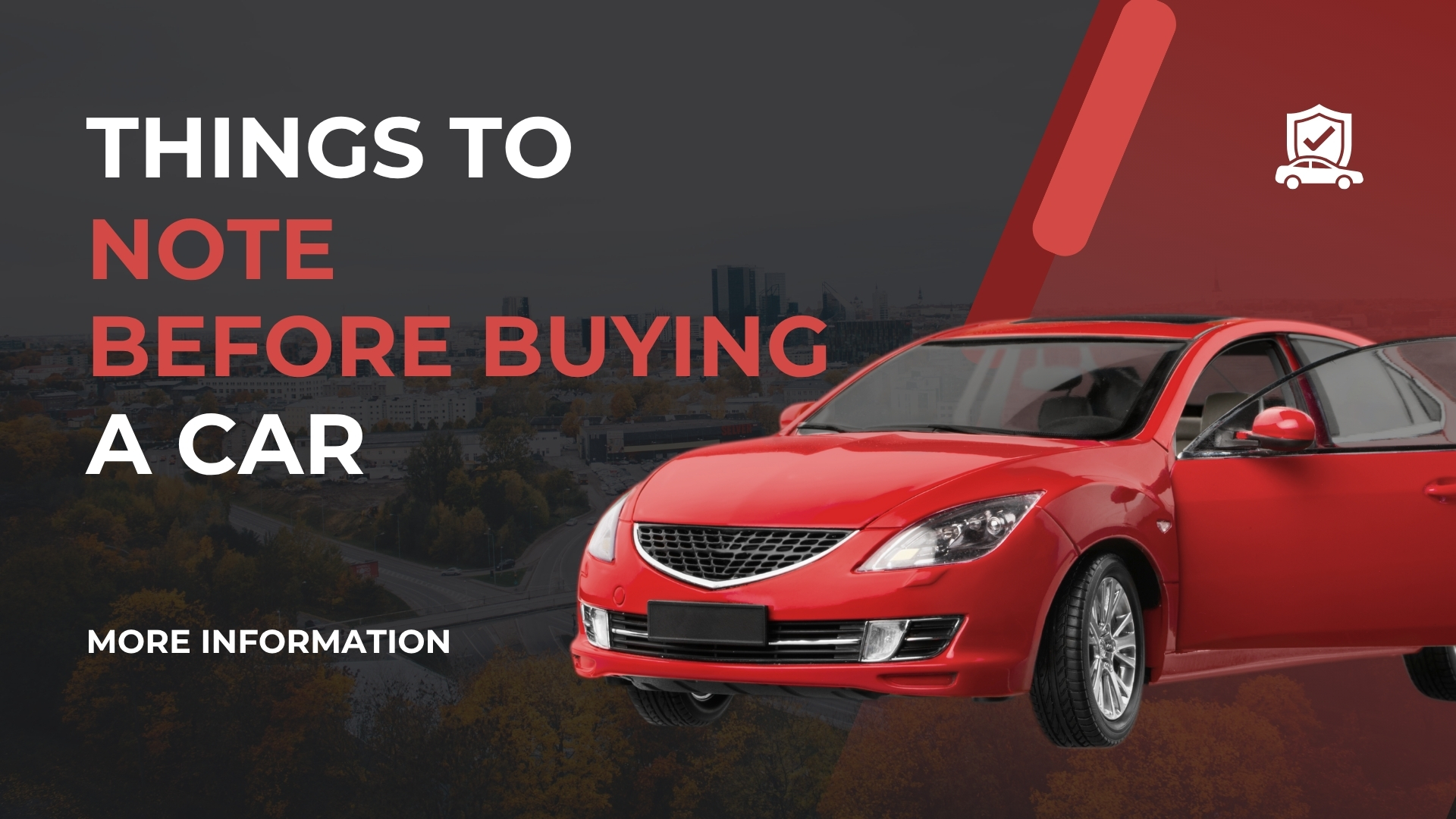Buying a car is a significant milestone—whether it’s your very first vehicle or an upgrade to suit your evolving needs. The process can be both exhilarating and overwhelming, with a multitude of choices, features, and financial implications to weigh. Making an informed decision is crucial, as a car is not just a mode of transportation but also a substantial financial investment that impacts your daily life.
Before you sign any paperwork or hand over your hard-earned money, there are several things to note before buying a car. From evaluating your needs and setting a realistic budget to understanding financing options and inspecting the vehicle’s condition, each step requires careful consideration. This comprehensive guide will walk you through everything you need to know, ensuring you drive away with confidence and peace of mind.
Whether you’re eyeing a shiny new model or considering a reliable used car, this article will help you navigate the complexities of the car-buying process. Read on to discover expert advice, practical checklists, and answers to frequently asked questions—so you can make the best choice for your lifestyle and budget.
The Essential Things to Note Before Buying a Car
1. Assess Your Needs and Preferences
Before stepping into a dealership or browsing online listings, take time to reflect on your actual requirements:
- Purpose: Will the car be used for daily commuting, family trips, or occasional leisure drives?
- Passenger Capacity: How many people do you need to accommodate regularly?
- Cargo Space: Do you need ample trunk space for luggage, sports equipment, or groceries?
- Fuel Efficiency: Is saving on fuel costs a priority for you?
- Preferred Features: Consider must-have features like automatic transmission, navigation system, safety technology, or entertainment options.
Comparison Table: New vs. Used Cars
| Feature | New Car | Used Car |
|---|---|---|
| Price | Higher | Lower |
| Depreciation | Rapid in first years | Slower after initial drop |
| Warranty | Full manufacturer warranty | May have limited/no warranty |
| Maintenance Costs | Lower initially | Potentially higher |
| Technology | Latest features | May lack modern tech |
| Insurance | Typically higher | Usually lower |
2. Set a Realistic Budget
Determining your budget is one of the most critical things to note before buying a car. Consider:
- Down Payment: How much can you afford upfront?
- Monthly Payments: What is a comfortable monthly payment for you?
- Total Cost of Ownership: Factor in insurance, taxes, registration, fuel, maintenance, and repairs.
- Financing Options: Explore loans, leasing, or paying cash. Compare interest rates and loan terms.
Tips for Budgeting
- Use online car loan calculators to estimate monthly payments.
- Don’t forget hidden costs like extended warranties or dealer fees.
- Aim to keep your car-related expenses below 15% of your monthly income.
3. Research and Shortlist Vehicles
Armed with your needs and budget, start researching:
- Reliability Ratings: Check reviews from sources like Consumer Reports or J.D. Power.
- Resale Value: Some brands and models retain value better than others.
- Safety Ratings: Look for crash-test results from agencies like the IIHS or NHTSA.
- Ownership Reviews: Read feedback from current owners to identify common issues.
Related Keywords:
- Car buying checklist
- Things to check before buying a car
- Car purchase tips
4. Decide Between New and Used
Each option has its pros and cons:
New Cars
- Latest technology and safety features
- Full warranty coverage
- Higher price and faster depreciation
Used Cars
- Lower price and slower depreciation
- Potential for more features at a lower cost
- May have unknown history or wear
5. Inspect the Vehicle Thoroughly
If you’re buying a used car, a thorough inspection is non-negotiable:
- Exterior: Check for dents, scratches, rust, or mismatched paint.
- Interior: Inspect upholstery, dashboard, and electronics.
- Engine: Look for leaks, corrosion, or unusual noises.
- Tires: Examine tread depth and even wear.
- Test Drive: Pay attention to handling, brakes, acceleration, and comfort.
Pro Tip:
Consider hiring a trusted mechanic for a pre-purchase inspection.
6. Review the Vehicle History Report
For used cars, always request a comprehensive history report (e.g., Carfax or AutoCheck):
- Accident history
- Title status (clean, salvage, rebuilt)
- Odometer readings
- Service and maintenance records
- Number of previous owners
7. Evaluate Financing and Payment Options
Compare different financing methods:
- Bank or Credit Union Loans: Often offer better rates than dealerships.
- Dealer Financing: Convenient but may come with higher interest rates.
- Leasing: Lower monthly payments but mileage limits and no ownership at end of term.
Related Keywords:
- Car loan tips
- Car financing advice
8. Negotiate the Price
Negotiation is a standard part of the car-buying process:
- Research Market Value: Use resources like Kelley Blue Book or Edmunds to know the fair price.
- Be Prepared to Walk Away: Don’t be pressured into a deal that doesn’t meet your criteria.
- Consider Timing: End of the month, quarter, or year can be ideal for discounts.
9. Understand the Paperwork
Ensure all documents are in order:
- Bill of Sale: Outlines the terms of the transaction.
- Title and Registration: Essential for legal ownership.
- Warranty Documents: Details on coverage and duration.
- Loan Agreement: Read all terms carefully before signing.
10. Finalize Insurance and Registration
Before driving off, make sure you:
- Purchase Adequate Insurance: Liability, collision, and comprehensive coverage as needed.
- Register the Vehicle: Complete registration with your local DMV.
- Transfer Plates (if applicable): Follow state regulations for license plates.
FAQ: Things to Note Before Buying a Car
What are the most important things to check before buying a used car?
- Vehicle history report
- Mechanical inspection by a trusted mechanic
- Test drive performance
- Title status and ownership history
Should I buy a new or used car?
It depends on your budget, desired features, and how long you plan to keep the car. New cars offer more reliability and the latest features, while used cars provide better value and lower depreciation.
How can I get the best deal on a car?
- Research prices and incentives
- Shop at the end of the month or year
- Get pre-approved for financing
- Be willing to negotiate and walk away if needed
What documents do I need to buy a car?
- Valid driver’s license
- Proof of insurance
- Proof of income (for financing)
- Title and registration (for used cars)
How do I avoid buying a lemon?
- Always get a vehicle history report
- Have the car inspected by a mechanic
- Buy from reputable dealers or private sellers
Additional Considerations Before Buying a Car

Environmental Impact
- Fuel Efficiency: Choose cars with higher MPG or consider hybrids/electric vehicles.
- Emissions: Check if the vehicle meets local emission standards.
Future Resale Value
- Opt for popular models with a reputation for reliability.
- Maintain the car well and keep service records.
Ownership Costs
- Research average maintenance and repair costs for your chosen model.
- Consider the availability and price of spare parts.
Lifestyle Changes
- Anticipate future needs—family expansion, job changes, or relocation.
Conclusion: Make a Smart, Informed Car Purchase
Buying a car is a major decision that requires careful thought and preparation. By keeping these things to note before buying a car in mind, you’ll be well-equipped to navigate the process with confidence. Assess your needs, set a realistic budget, research thoroughly, and never skip the inspection and paperwork. Whether you choose a new or used vehicle, making an informed choice ensures your investment brings you satisfaction and peace of mind for years to come.
Final Takeaway
Take your time, ask questions, and don’t rush the process. The right car will meet your needs, fit your budget, and provide reliable service. Remember: knowledge is your best tool when making a significant purchase like a car.





